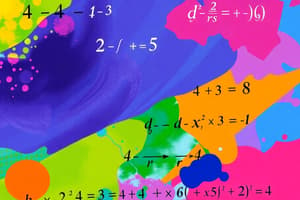Podcast
Questions and Answers
What is the absolute value of a number, x?
What is the absolute value of a number, x?
- The negative of x
- The distance of x from zero on the number line (correct)
- The product of x and zero
- The sum of x and zero
What is the additive inverse of a?
What is the additive inverse of a?
-a
An algebraic expression can contain numbers but no variables.
An algebraic expression can contain numbers but no variables.
False (B)
What does a coefficient refer to?
What does a coefficient refer to?
How can you form a compound inequality?
How can you form a compound inequality?
A constant is a quantity that can change.
A constant is a quantity that can change.
What is a constant term?
What is a constant term?
What is an equation?
What is an equation?
What does it mean to evaluate an algebraic expression?
What does it mean to evaluate an algebraic expression?
An extraneous solution is a valid solution of the original equation.
An extraneous solution is a valid solution of the original equation.
What is an identity in terms of equations?
What is an identity in terms of equations?
What are inverse operations?
What are inverse operations?
Like terms can have different variables raised to the same powers.
Like terms can have different variables raised to the same powers.
What is a literal equation?
What is a literal equation?
What is the multiplicative inverse of a nonzero number a?
What is the multiplicative inverse of a nonzero number a?
A numerical expression can include letters.
A numerical expression can include letters.
What is the opposite of a?
What is the opposite of a?
What is a solution of an equation?
What is a solution of an equation?
What constitutes a term of an expression?
What constitutes a term of an expression?
What is a variable?
What is a variable?
What is a variable quantity?
What is a variable quantity?
How can you represent patterns?
How can you represent patterns?
What are the subsets of real numbers?
What are the subsets of real numbers?
What are the properties used to simplify and evaluate expressions?
What are the properties used to simplify and evaluate expressions?
How do you evaluate an algebraic expression?
How do you evaluate an algebraic expression?
What must you consider when rewriting equations with absolute values?
What must you consider when rewriting equations with absolute values?
Flashcards are hidden until you start studying
Study Notes
Key Algebra Concepts
-
Absolute Value: Represented as |x|, signifies the distance of x from zero on the number line.
-
Additive Inverse: The additive inverse of a number a is -a; their sum equals zero, the additive identity.
-
Algebraic Expression: A mathematical phrase containing one or more variables, representing a relationship between quantities.
-
Coefficient: The numerical factor that multiplies a variable in a term, crucial for identifying terms in expressions.
-
Compound Inequality: Two inequalities combined using and or or, allowing for complex relationships between variables.
-
Constant: A value that remains unchanged, important in equations and expressions.
-
Constant Term: A term in an expression that contains no variables, contributing to the value of the expression.
-
Equation: A statement that asserts the equality of two algebraic expressions, fundamental in problem-solving.
-
Evaluate: The process of substituting values for variables in an expression and simplifying the result using order of operations.
-
Extraneous Solution: A solution that arises during solving an equation but does not satisfy the original equation.
-
Identity: An equation that holds true for every possible value of a variable, essential for verifying mathematical statements.
-
Inverse Operations: Operations that reverse each other; for example, addition and subtraction or multiplication and division.
-
Like Terms: Terms that share the same variables raised to the same powers, which can be combined during simplification.
-
Literal Equation: An equation involving multiple letters as variables, commonly seen in formulas and relations.
-
Multiplicative Inverse: The reciprocal, 1/a, of a nonzero number a; when multiplied together, they yield the multiplicative identity, 1.
-
Numerical Expression: A collection of numbers and operation symbols, simpler than algebraic expressions since they lack variables.
-
Opposite: Identical to the additive inverse; the sum of a number and its opposite is zero.
-
Reciprocal: Another term for the multiplicative inverse; the reciprocal of a number multiplied by that number equals one.
-
Solution of an Equation: A value that satisfies the equation, making both sides equal.
-
Term of an Expression: Can be a number, variable, or a product of both, forming the building blocks of expressions.
-
Variable: A symbol, typically a letter, representing one or more numbers, essential in algebra for generalizing equations.
-
Variable Quantity: A variable that can take on different values, highlighting the dynamic nature of algebra.
Lessons Overview
-
Lesson 1: Patterns and Expressions: Patterns can be expressed using various forms; identifying patterns involves recognizing consistent changes and can be assisted by tables.
-
Lesson 2: Properties of Real Numbers: Real numbers include natural, whole, integer, rational, and irrational numbers. Significant properties include:
- Commutative Properties: Addition and multiplication can be performed in any order.
- Associative Properties: The grouping of numbers does not affect the result in addition and multiplication.
- Distributive Property: Allows expansion of expressions involving addition within parentheses.
-
Lessons 3, 4, and 5: Expressions, Equations, and Inequalities:
- To evaluate an expression, substitute values for variables.
- Simplification involves combining like terms.
- Solutions to equations and inequalities rely on the properties of equality and inequality.
-
Lesson 6: Absolute Value Equations and Inequalities:
- When dealing with absolute values, consider both positive and negative cases to achieve complete solutions.
Studying That Suits You
Use AI to generate personalized quizzes and flashcards to suit your learning preferences.




